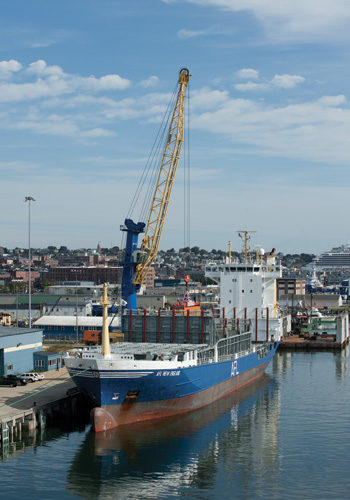A coastal container feeder service linking New England and Nova Scotia ports has been shut down after just nine months. The decision was a blow for those advocating coastal shipping as a way to shift substantial amounts of cargo from congested highways and railroads onto underutilized American waterways.
American Feeder Lines (AFL) announced in May that it was ending its weekly container service linking Halifax, Nova Scotia; Portland, Maine; and Boston. The setback was particularly disappointing since AFL had earlier voiced ambitious expansion plans based on construction of its own fleet of Jones Act-compliant container vessels.
AFL was operating AFL New England, a 400-foot British-flagged container vessel on charter when the company ceased operations. AFL’s failure echoed that of a service operated by Hapag-Lloyd using a vessel called Yankee Clipper serving the same three ports. That service, which shared the same leadership as the AFL venture, came to an end in 2009.
AFL’s cargo volumes had been steadily increasing with inbound containers of grain alcohol and consumer goods and outbound shipments of forest and paper products, according to Rudy Mack, AFL’s chief operating officer.
But that growth was apparently not great enough to cover expenses, even with a $200,000 loan from the Maine Port Authority. The province of Nova Scotia had also approved a loan to AFL for $500,000 with the hope of attracting more New England-bound container business for the Port of Halifax.
“We invested $4 million dollars and that is gone,” said Mack of himself and his fellow investors. “It was not enough, even though business was increasing. We had no choice.”
Despite the failure of AFL, Mack said he is still convinced that container feeder services will become a reality in Maine and other ports, but he cautioned that it will take time and will need the support of shippers as well as state, federal and local governments to create the infrastructure needed to manage goods cost effectively.
In an interview with Professional Mariner, John Henshaw, executive director of the Maine Port Authority, said that he was still confident that a short-sea shipping/feeder service was feasible, not only for Portland, but other ports as well. “Highways are overcrowded and fuel is expensive; also our highway system is in need of repair,” he said.
Janine Bisaillon-Cary, president of the Maine International Trade Center, agreed that short-sea shipping has a future. “I think that there are viable options for short-sea shipping both for international container freight and possibly domestic freight,” she said. “The hurdles are that there are not a lot of efficient vessels out there to do this and right now the recession is not helping in terms of carriers adding new services.”
“AFL underestimated the time and effort that it was going to take to build the business,” she said. “Unfortunately, they pulled out right when volumes were picking up in terms of Maine imports and exports; they had signed on with a number of major steamship lines connecting the Portland/Halifax cargo with most of the world markets.”
But is short-sea shipping really the wave of the future? The U.S. Maritime Administration (MarAd) believes it is and is promoting its vision of a marine highway system linking coastal and inland river ports. It has designated 18 marine highway corridors and awarded $215 million in grants to marine highway and port projects like the one in Portland. MarAd is even exploring the use of specially designed Jones-Act-compliant articulated tug barges that could be built in the U.S. at a third of the cost of a standard containership and would be cheaper to operate.

